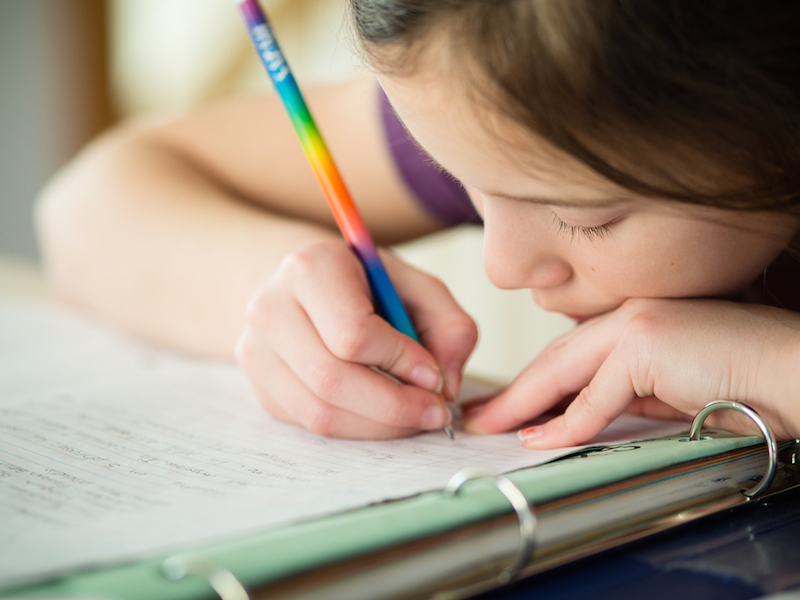Nix Homework to Help Students? What the Science Says

A Texas teacher's note to parents about her newly implemented "no formal homework policy" in her second-grade class went viral last week, opening up the floodgates for parents, teachers and school administrators to weigh in on this controversial topic.
In the note, teacher Brandy Young told parents that her students' only homework would be work that they did not finish during the school day.
Instead of having kids spend time on homework, parents should "spend your evenings doing things that are proven to correlate with student success," Young said. She recommended that parents "eat dinner as a family, read together, play outside and get your child to bed early," strategies that she suggests are more closely tied to a child's success in the classroom than doing homework.
Young's rationale for her new policy, as she explained in her note, was that "research has been unable to prove that homework improves student performance." [10 Scientific Tips for Raising Happy Kids]
Live Science spoke with three educators who have conducted research on homework and student performance to fact-check this statement, and to find out what studies have shown about homework's positive and negative effects.
Keys to student success
It's accurate to suggest that studies have found no correlation between homework in elementary school and a student's academic performance, but there is one important exception worth mentioning, said Denise Pope, a senior lecturer at the Stanford University Graduate School of Education.
Get the world’s most fascinating discoveries delivered straight to your inbox.
Research has shown that free reading, or allowing students to read whatever books they want, does improve their academic performance, Pope said. Some elementary school teachers assign free reading as homework, but kids and parents do not always perceive these assignments as true homework that must be completed, she explained. [Best Science-y Books for Kids]
In middle school, the evidence shows a slight correlation between doing homework and academic achievement, but further improvement fades after a middle-school student has spent 60 to 90 minutes a night doing homework, said Pope, who is also the co-founder of Challenge Success, an organization that works with schools and families to develop research-based strategies that engage kids and keep them healthy.
But it's tricky to draw conclusions from homework studies, because these studies use such varied ways of measuring a student's academic performance, Pope said. Some researchers use standardized test scores to measure achievement, while others use students' grade-point averages, she said.
Another variable that can complicate the results of homework studies is that it's hard to know who is actually doing the assignment when it's taken home, Pope said. For example, a student could get help from a parent, tutor, sibling or classmate to complete the work.
In high school, there is a strong correlation between students who do 2 hours of homework a night and higher levels of academic achievement, but again, this improvement fades when students exceed the 2-hour threshold, Pope told Live Science. [Top 5 Benefits of Play]
Pope said she considers the advice that the viral note offered to parents —to eat dinner as a family, read together, play outside and get a child to bed early — to be "spot on." She added that there is "really good research" to correlate these four variables with student success.
Studies suggest that to perform at their best in school, kids in second grade need sufficient sleep, playtime with their siblings and friends, and downtime, meaning time to transition from school to home. Kids also benefit from regular family time, which ideally takes place five times a week for at least 25 minutes and could take the form of a family meal, Pope said. Making time for reading is also important for a child's success in the classroom, she said.
Learning through practice
But not all educators share Pope's opinions of a no-homework policy for second graders.
The contention that "research is unable to prove that homework improves student performance" is an overstatement, said Harris Cooper, a professor of psychology and neuroscience at Duke University in Durham, North Carolina, who has been researching homework and student performance for 30 years.
"Even in kids as young as age 7, research shows that homework in particular areas can help students learn, especially things children need to learn through practice," said Cooper, the author of "The Battle Over Homework" (Corwin, 2006).
Even when looking at levels as early as second grade, studies have found that kids who study a little bit at home may do better on spelling, vocabulary and math tests given in the classroom, Cooper told Live Science. However, he noted that the correlation between doing homework and higher academic achievement is not as strong in elementary students, who generally don't get much homework, as it is in middle-school and high-school students.
Rather than a no-homework policy for second graders, Cooper said he would recommend that homework for kids at this age be kept short and simple. It should take no more than about 20 minutes a night for second graders to complete their homework, he said.
To estimate an appropriate amount of time for students to spend doing homework, educators may use "the 10-minute rule" which means multiplying a child's grade level by 10 minutes of homework a night, Cooper explained. That means first graders get 10 minutes of homework, second graders get 20 and so on.
Besides just the skills in math, reading or other subjects themselves, homework can have positive effects on children's time-management and study skills, Cooper said. It can also help keep parents informed of what children are learning at school, and help make Mom and Dad aware of their child's strengths and weaknesses, he said.
But too much homework in second grade or assignments that are too hard can have a negative impact on young learners, Cooper said. "The last thing you want is for a 7-year-old to be bored [or] frustrated, or think that he or she is not good in school," he added.
Some parents who are extremely concerned about ensuring that their children achieve to their maximal ability may put pressure on educators, and this has led some teachers to assign students too much homework, especially at the high-school level, Cooper said.
But the key is for students to get the right amount of homework — not too much of it and not too little — so that it can have positive effects on learning and school performance, Cooper said.
Homework and family life
But other educators are steadfast that the right amount of homework in elementary school may be little to none.
Research suggests that homework in elementary school does not have a positive effect on student achievement, and could even have a negative impact, said Etta Kralovec, an associate professor of teacher education at the University of Arizona South, and the author of "The End of Homework" (Beacon Press, 2001).
The findings are more complex in middle- and high-school students, with many studies finding a correlation between classroom grades and homework, Kralovec said. But these results could also raise additional questions, because tracking students — separating them into lower-level and advanced-level classes, for example — also begins at these grades, and kids in the higher-track classes are often assigned more homework.
It may not be that homework actually causes students to get better grades in high school or middle school, it could be that students who do more homework were better students to begin with, Kralovec said.
It's also hard to know how much actual time students truly spend on homework, because most research relies on self-reported data from students, parents or teachers, Kralovec said. The amount of time a student reports spending on homework can differ from a parent's report of it, and it can also differ from the amount of time a teacher estimates students will need in order to complete the assignment, Kralovec explained.
Despite the research, the amount of time students spend doing homework remains a highly contentious topic in education, Kralovec told Live Science. And when a teacher's short note to parents about a no-homework policy goes viral, it shows that this topic has hit a very important nerve in the American family experience, she said.
Family life today is really challenging compared with decades past — with more working mothers and some parents working two or three jobs to make ends meet — and homework can add yet another stressor to the mix, Kralovec said.
If parents feel that the amount of homework students receive is too much and may be encroaching on family time, one strategy they may try is to get organized with other parents, Kralovec suggested.
Each school district may set its own policies about the amount of homework given to students. When parents have banded together in their communities, they have often been successful at having public discussions with administrators and teachers, and even moving assignment levels back to healthier levels, she said.
Originally published on Live Science.
Cari Nierenberg has been writing about health and wellness topics for online news outlets and print publications for more than two decades. Her work has been published by Live Science, The Washington Post, WebMD, Scientific American, among others. She has a Bachelor of Science degree in nutrition from Cornell University and a Master of Science degree in Nutrition and Communication from Boston University.





